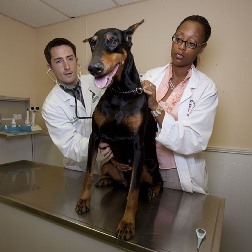How to Find the Right Veterinary Assistant Training near Cheshire Connecticut
 Fulfilling your long term goal of working with and caring for pets by enrolling in a veterinarian program near Cheshire CT could at first feel like a challenging undertaking. After all, you need to find and enroll in a college that will deliver the necessary training to ensure that you can succeed as a vet technician, assistant or technologist. But just how do you approach reviewing and comparing programs so that you can make the right choice? Many aspiring students begin their due diligence process by looking for schools that are close to their residences. Once they have found some area colleges, they ascertain which ones have the most affordable tuition and focus on those. Although cost and location are important factors when evaluating vet tech schools, they are not the only important ones when making your evaluations. Factors such as internship programs and accreditation should be looked into as well. The main idea is that there are questions you need to be asking the veterinary tech programs you are reviewing before you make a final choice. We have provided several in this article in order to help get you started, but before we discuss them we’ll discuss the varied responsibilities of vet assistants and techs and the training alternatives available.
Fulfilling your long term goal of working with and caring for pets by enrolling in a veterinarian program near Cheshire CT could at first feel like a challenging undertaking. After all, you need to find and enroll in a college that will deliver the necessary training to ensure that you can succeed as a vet technician, assistant or technologist. But just how do you approach reviewing and comparing programs so that you can make the right choice? Many aspiring students begin their due diligence process by looking for schools that are close to their residences. Once they have found some area colleges, they ascertain which ones have the most affordable tuition and focus on those. Although cost and location are important factors when evaluating vet tech schools, they are not the only important ones when making your evaluations. Factors such as internship programs and accreditation should be looked into as well. The main idea is that there are questions you need to be asking the veterinary tech programs you are reviewing before you make a final choice. We have provided several in this article in order to help get you started, but before we discuss them we’ll discuss the varied responsibilities of vet assistants and techs and the training alternatives available.
The Job of a Veterinary Tech and Assistant
 One of the initial decisions that you will need to make is whether you want to train as a vet assistant, technologist or technician. Part of your determination might be based on the amount of time and money that you have to commit to your training, but the primary determiner will undoubtedly be which specialty appeals to you the most. What vet techs and assistants share in common is that they each work under the direct supervision of a practicing and licensed veterinarian. And although there are many jobs that they can carry out within the Cheshire CT veterinary clinic or hospital, they can’t prescribe medications, diagnose health issues, or conduct surgical procedures. In those areas they may only provide assistance to a licensed vet. There are technologists and technicians that work away from the typical veterinarian practice, for instance for zoos, animal shelters or police departments. Let’s take a look at the responsibilities and training requirements for each specialty.
One of the initial decisions that you will need to make is whether you want to train as a vet assistant, technologist or technician. Part of your determination might be based on the amount of time and money that you have to commit to your training, but the primary determiner will undoubtedly be which specialty appeals to you the most. What vet techs and assistants share in common is that they each work under the direct supervision of a practicing and licensed veterinarian. And although there are many jobs that they can carry out within the Cheshire CT veterinary clinic or hospital, they can’t prescribe medications, diagnose health issues, or conduct surgical procedures. In those areas they may only provide assistance to a licensed vet. There are technologists and technicians that work away from the typical veterinarian practice, for instance for zoos, animal shelters or police departments. Let’s take a look at the responsibilities and training requirements for each specialty.
- Vet Assistants in almost all cases will have undergone a structured training program, either as an intern or apprentice in a vet clinic or hospital, or by finishing a certificate program at a vocational school or community college near Cheshire CT. As the name implies, their job function is to assist the vets and vet technicians in the performance of their duties. Usually they are not involved with more complex undertakings, for example assisting with surgical procedures. Some of their usual functions may include working at the front desk, cleaning and preparing examination rooms and equipment, or controlling animals during exams.
- Vet Technicians get more advanced training compared to assistants and normally obtain a 2 year Associate Degree, preferably from an American Veterinary Medical Association (AVMA) accredited program. They are in a sense the vet equivalent of medical nurses, since their basic job duty is to assist veterinarians with diagnosing and treating animal patients. Where they vary from vet assistants is that they are involved in more complicated tasks, such as assisting with surgeries or administering medicine. All states presently mandate that veterinary techs pass a credentialing examination for either licensing, registration or certification.
- Vet Technologists are similar to vet techs and for the most part perform the same job functions. They are required to attain a Bachelor’s Degree in veterinary technology, which generally requires 4 years to complete. So the main distinction between a vet technologist and a technician is the technologist’s more advanced level of education. But with an advanced degree comes more job opportunities, increased salaries and possible management positions. They are also mandated to pass a credentialing examination for either certification, registration or licensing.
Veterinary technicians and technologists can specialize in areas such as anesthesia, internal medicine or urgent care. Some may receive certification from the American Association for Laboratory Animal Science (AALAS) to work in laboratories or Cheshire CT area research facilities as well.
Online Vet Degree Programs
 An approach that may be a solution for those with a busy lifestyle or who are working full-time while going to veterinary college is to enroll in an online training program. Because the classes are offered through the internet, students can study on their own timetable wherever a computer is accessible. The curriculum is taught using several venues, including slide shows, videos and live streaming webinars. And since many vet technician and technologist degrees require practical training, that portion can usually be completed as an internship or work study program at an area Cheshire CT veterinarian clinic or hospital. Distance learning, as it is also called, can in many instances lower the cost of your education. Tuition and supplementary expenditures, such as for commuting and study supplies, may be cheaper compared to more traditional classroom courses. Just make sure that the program that you enroll in is accredited, either by the AVMA or another nationally recognized accrediting organization. With the online courses and the practical training, everything is furnished for a complete education. So if you are disciplined enough to learn in this more independent mode, an online veterinary technician or assistant school may be the right choice for you.
An approach that may be a solution for those with a busy lifestyle or who are working full-time while going to veterinary college is to enroll in an online training program. Because the classes are offered through the internet, students can study on their own timetable wherever a computer is accessible. The curriculum is taught using several venues, including slide shows, videos and live streaming webinars. And since many vet technician and technologist degrees require practical training, that portion can usually be completed as an internship or work study program at an area Cheshire CT veterinarian clinic or hospital. Distance learning, as it is also called, can in many instances lower the cost of your education. Tuition and supplementary expenditures, such as for commuting and study supplies, may be cheaper compared to more traditional classroom courses. Just make sure that the program that you enroll in is accredited, either by the AVMA or another nationally recognized accrediting organization. With the online courses and the practical training, everything is furnished for a complete education. So if you are disciplined enough to learn in this more independent mode, an online veterinary technician or assistant school may be the right choice for you.
Questions to Ask Vet Assistant and Tech Programs
 By now you probably have determined which veterinarian credential that you want to obtain, and if you intend to study online or attend a school on campus. Since there are a large number of veterinary community colleges, vocational and trade schools in Connecticut and across the United States, you must ask some qualifying questions in order to fine tune your list of options. As we discussed in our opening, many future students start by prioritizing location and the cost of tuition. But we have already touched on other essential qualifiers, for instance internship programs and accreditation. And of course you need to enroll in a school that offers the specialty and degree that you want to earn. These and other factors are addressed in the list of questions that you should ask the Cheshire CT veterinary assistant and technician programs that you are reviewing.
By now you probably have determined which veterinarian credential that you want to obtain, and if you intend to study online or attend a school on campus. Since there are a large number of veterinary community colleges, vocational and trade schools in Connecticut and across the United States, you must ask some qualifying questions in order to fine tune your list of options. As we discussed in our opening, many future students start by prioritizing location and the cost of tuition. But we have already touched on other essential qualifiers, for instance internship programs and accreditation. And of course you need to enroll in a school that offers the specialty and degree that you want to earn. These and other factors are addressed in the list of questions that you should ask the Cheshire CT veterinary assistant and technician programs that you are reviewing.
Is the Veterinary School Accredited? It’s imperative that you confirm that the vet assistant or tech program you enroll in is accredited by a regional or national accrediting agency. As previously stated, among the most highly regarded is the American Veterinary Medical Association (AVMA). Vocational schools and colleges that are accredited by the AVMA have undergone a demanding screening process that confirms you will receive a quality education. Also, accreditation is essential if you are applying for a student loan or financial assistance, since a large number of programs are not offered for non-accredited programs. Last, having a certificate or degree from an accredited program is frequently a precondition for employment for many Cheshire CT vet clinics and hospitals.
What is the Program’s Reputation? The veterinarian vocational school or college and program you choose must have an exceptional reputation within the vet field. You can initiate your due diligence by asking the schools you are looking at for endorsements from the employers in their job placement network. Other suggestions include looking on online school ranking websites and checking with the school’s accrediting organizations as well. You can ask the Connecticut school licensing authority if there have been any grievances or infractions relating to your specific schools. As a final suggestion, call some Cheshire CT veterinary clinics that you might wish to work for after you go through your training. Ask what they think of your school choices. They may even suggest one or more programs not on your list.
Are there Internship Programs? The most effective way to get clinical hands on training as a vet assistant or technician is to work in a clinical environment. Find out if the schools you are reviewing have internship programs set up with area veterinarians, vet hospitals or practices. Almost all veterinary medicine programs mandate clinical training and many furnish it by way of internships. Not only will the experience be beneficial as far as the clinical training, but an internship may also help build relationships in the local Cheshire CT veterinarian community and assist in the search for employment after graduation.
Is Job Assistance Offered? Searching for a job after graduating from a vet technician or assistant college may be challenging without the assistance of a job placement program. To begin with, find out what the graduation rates are for the schools you are evaluating. A lower rate may indicate that the teachers were unqualified to teach the syllabus or that a number of students were disappointed with the program and quit. Next, verify that the schools have a job assistance program and ask what their placement rates are. A higher placement rate could indicate that the Cheshire CT college has an outstanding reputation within the veterinarian community and has a considerable network of contacts for student placements. A low rate might mean that the training is not highly regarded by employers or that the job placement program is a failure at placing students.
How Big are the Classes? If the classes are larger sized, you most likely will receive little or no individualized instruction from the teachers. Request from the Cheshire CT colleges you are researching what their class student to teacher ratios are. You may also want to attend a couple of classes (if practical) to monitor the interaction between students and teachers. Ask for feedback from students relating to the quality of instruction. Also, talk with the instructors and find out what their qualifications are as well as their methods of teaching.
Where is the College Located? Of course, we previously covered location, but there are a few more points to consider on the topic. If you are going to drive to your veterinary assistant classes from work or home, you have to make certain that the commuting time is compatible with your schedule. For example, driving during the weekend to investigate the route won’t be the same as the commute during rush hour traffic, particularly if the Cheshire CT college is located in or close by a larger city. Also, if you do opt to enroll in a college in another state or even outside of your County of residence, there may be higher tuition charges particularly for community and state colleges. Of course taking online classes could be an option that will give you more flexibility and decrease the necessity for travel.
Is the Class Schedule Flexible? And last, it’s important that you ascertain if the Connecticut veterinarian schools you are evaluating offer class times flexible enough to fit your schedule. For instance, a number of students continue working full time and can only attend classes on the weekends or in the evenings. Some may only be able to attend classes in the morning or in the afternoon. Verify that the class times you require are available near Cheshire CT prior to enrolling. In addition, determine if you can make-up classes that you might miss as a result of illness, work or family emergencies. You might find that an online program is the best way to fit your vet training into your busy life.
Why Did You Want to Become a Vet Tech?
When preparing to interview for a veterinary position, it's advantageous to consider questions you may be asked. Among the questions that interviewers typically ask veterinary candidates is "What drove you to pick veterinary care as a profession?". What the interviewer is hoping to uncover is not merely the personal reasons you might have for becoming a vet tech, but additionally what characteristics and skills you possess that make you outstanding at your profession. You will likely be asked questions relating primarily to veterinary care, as well as a significant number of routine interview questions, so you must ready a number of strategies about how you want to address them. Because there are so many factors that go into choosing a career, you can respond to this primary question in a multitude of ways. When formulating an answer, attempt to include the reasons the profession interests you along with the abilities you have that make you an excellent vet tech and the perfiect candidate for the job. Don't make an effort to memorize an answer, but write down some ideas and topics that pertain to your own experiences and strengths. Reading through sample answers can assist you to develop your own thoughts, and provide ideas of what to discuss to enthuse the recruiter.Pick the Ideal Vet Technologist Program near Cheshire CT
Picking the ideal vet technician program is a crucial first step to beginning a rewarding career providing care and treatment for animals. Potential students considering vet tech or assistant colleges need to make their determination based on a number of key issues. Veterinary assistants, techs and technologists work in animal hospitals, veterinary clinics and animal shelters. They usually take on administrative tasks and support the veterinarian with the animal patients as needed. As we have discussed, it’s very important that you decide on a veterinary medicine program that is both accredited and has an outstanding reputation within the profession. This applies to online vet tech programs as well. By asking the questions included in our checklist for assessing schools, you will be able to reduce your options so that you can make your final selection. And by selecting the best program, you can reach your goal of becoming a vet assistant, technician or technologist in Cheshire CT.
A Little Bit About Cheshire CT
Cheshire, Connecticut
Cheshire (/ˈtʃɛʃər/), formerly known as New Cheshire Parish,[3] is a town in New Haven County, Connecticut, United States. At the time of the 2010 census, the population of Cheshire was 29,261.[4] The center of population of Connecticut is located in Cheshire.[5]
Cheshire, Connecticut was first settled in 1694 as part of Wallingford, Connecticut. It was then known as New Cheshire Parish. After many attempts in securing their independence from Wallingford, New Cheshire Parish was granted secession and was later incorporated as a town in May 1780 as Cheshire.[6]
Prospect, Connecticut was formerly part of Cheshire before 1829, and was then known as Columbia Parish.[3]
More Cities of Interest in Connecticut
